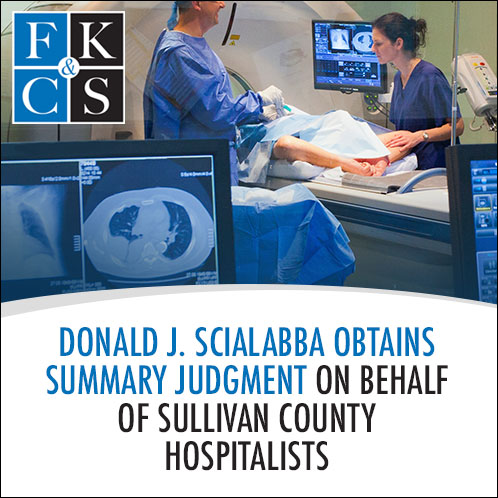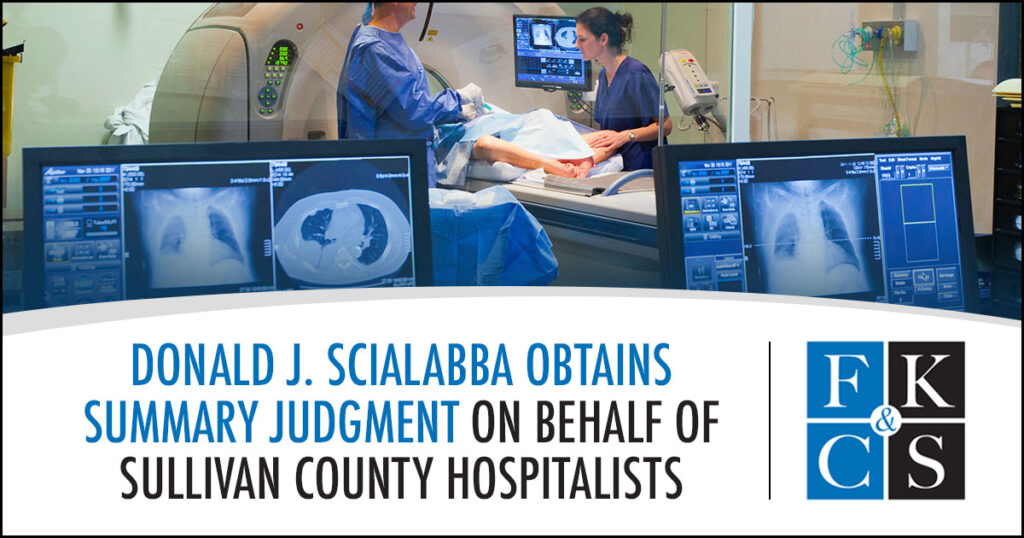Donald J. Scialabba recently obtained a summary judgment dismissal for Feldman, Kleidman, Collins & Sappe LLP’s (FKC&S) clients, two hospitalists and one critical care specialist in Sullivan County, who treated the plaintiff’s decedent during an admission to Catskill Regional Medical Center (CRMC) in 2013.
recently obtained a summary judgment dismissal for Feldman, Kleidman, Collins & Sappe LLP’s (FKC&S) clients, two hospitalists and one critical care specialist in Sullivan County, who treated the plaintiff’s decedent during an admission to Catskill Regional Medical Center (CRMC) in 2013.
On October 23, 2013, the decedent – then a 79-year-old patient – experienced a loss of consciousness and was brought to CRMC by ambulance. He was diagnosed in the emergency room (ER) with acute pancreatitis and gallstones and was admitted to the hospital. He had a history of hypertension, hyperlipidemia, anemia, headache, chronic kidney disease and alcohol use. The ER physician ordered an MRI of the head, but the patient was claustrophobic. One hospitalist ordered one milligram of Ativan, a benzodiazepine, to calm him so the MRI could be performed. It revealed no intracranial abnormality.
Following the MRI, the patient became confused, disoriented, agitated and aggressive, and had symptoms of withdrawal from alcohol abuse. Another hospitalist prescribed additional Ativan for the suspected alcohol withdrawal. After several doses of Ativan, his symptoms increased. His family insisted that he did not abuse alcohol and claimed that the symptoms were the result of an idiosyncratic reaction to Ativan.
Another hospitalist, not a named defendant, evaluated the patient and was of the opinion that, because he then had been in the hospital for more than a week, his altered mental status was not the result of alcohol withdrawal, but probably due to metabolic encephalopathy from infection, or a reaction to Ativan. He then discontinued all benzodiazepines on October 30, 2013. The patient’s mental status improved over the next week but did not return to normal. His mental status then significantly deteriorated on November 7, 2013, and he was transferred to Albany Medical Center (AMC) the following day so that he could receive a higher level of care. He remained at AMC until December 13, 2013, and his mental status slowly improved. He was discharged to a rehab facility where he remained for several months until he was discharged home.
Summary judgment is considered a “drastic remedy” because, if granted, the parties do not have an opportunity to try their case before a jury. Once a showing is made on a summary judgment motion that there is no legitimate basis for a jury trial because there is not a provable claim, it is incumbent on the party opposing the motion (usually the person suing) to “lay bare their proof” and demonstrate that there is evidentiary support for their claim.
Summary judgment was granted to FKC&S’s clients because Scialabba successfully demonstrated that it was necessary to treat the patient with Ativan for the suspected withdrawal from alcohol abuse. Failing to treat a patient who is in alcohol withdrawal would likely result in death. Also, although his mental status improved to some extent after the benzodiazepines were discontinued, the decedent ultimately experienced increased altered mental status a week after the benzodiazepines were discontinued. Therefore, his altered mental status was not caused by a reaction to that medication. At the time of his discharge from AMC, there was no definitive diagnosis as to the cause of his altered mental status. The AMC record reflected that the altered mental status was probably the result of metabolic encephalopathy from pancreatitis.
As in this matter, and many others in which FKC&S has prevailed, the plaintiff (the party suing) was not able to demonstrate that there was evidence of a provable claim that required a jury trial. By winning a dismissal at this stage, FKC&S’s clients were spared the time, expense and mental trauma of going through a lengthy trial. Instead, they can spend their time taking care of their patients.

